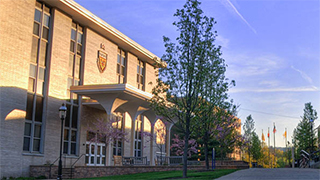Economics in the College of Arts and Sciences
Wednesday, June 25, 2025
 The College of Arts and Sciences has recently bolstered its longstanding B.A. in Economics (ECAS), housed in the Department of Political Science and Public Affairs, with an outstanding new faculty member, Monica Widmann, Ph.D. An expert in comparative
political economy with a Ph.D. from UCLA. Following postdoctoral fellowships at Princeton
University and the Technical University of Munich, Widmann joins the College of Arts
and Sciences as an Assistant Professor in the Department of Political Science and
Public Affairs. To deepen the partnership between the College of Arts and Sciences
and the Stillman School of Business, Widmann will enjoy a secondary appointment in
the Department of Economics and Legal Studies.
The College of Arts and Sciences has recently bolstered its longstanding B.A. in Economics (ECAS), housed in the Department of Political Science and Public Affairs, with an outstanding new faculty member, Monica Widmann, Ph.D. An expert in comparative
political economy with a Ph.D. from UCLA. Following postdoctoral fellowships at Princeton
University and the Technical University of Munich, Widmann joins the College of Arts
and Sciences as an Assistant Professor in the Department of Political Science and
Public Affairs. To deepen the partnership between the College of Arts and Sciences
and the Stillman School of Business, Widmann will enjoy a secondary appointment in
the Department of Economics and Legal Studies.
The B.A. in Economics offers students an opportunity to study economics in the context
of an undergraduate liberal arts education. By combining the flexibility and expansiveness
of the College’s Core Curriculum with the economics courses taught by Stillman faculty
experts, the program enables students to analyze economic issues within political,
social, ethical, and historical contexts. This approach prepares students to understand
complex global challenges with quantitative expertise, analytical depth, humanistic
insight, and all the nuances of social sciences. Seton Hall has long offered students
the opportunity to study economics in the context of an excellent undergraduate business
school education with the B.S. in Economics (ECON) offered by the Stillman School
of Business, and with the bolstering of the B.A. in Economics (ECAS) program, Seton
Hall is positioned to offer its students a choice to pursue the study of economics
in whichever broader education context that best suits their needs and aspirations.
Studying economics in a liberal arts setting encourages students to explore not just
the “how” of economic systems, but also the “why”: Why do certain policies emerge?
How do they affect different communities? How do rights, responsibilities, values,
and other things constitute economies and relate to financial economics? And what
ethical and historical forces are at play in these relationships? The faculty supporting
this new program bring a wealth of knowledge and experience to the classroom. Widmann
joins Michael Taylor, Ph.D., and Terrence Teo, Ph.D., in the Department of Political
Science and Public Affairs as teachers and scholars with expertise in economics and
political economy who help students investigate the connections between markets, the
environment, governance and public life.
Housing the B.A. in Economics within the Department of Political Science and Public
Affairs will provide ECAS majors with academic advisors in the College of Arts and
Sciences who know the extent of the College’s offerings and how they can enrich student
learning about topics that matter most to them, whether they involve the intersection
of economics and the sciences, law, history, or technology. The Department of Political
Science and Public Affairs is exploring the development of a quantitative B.S. in
Political Economy, designed to strengthen students’ data analysis and numeracy skills
for graduate study or careers in analytics and policy. The Department of Political
Science and Public Affairs is considering possibilities for a master's in political
economy or other graduate program that integrates the study of politics, economics,
and human behavior, an interdisciplinary and humanistic social science degree that
equips students to examine mechanisms for advancing economic security and democratic
citizenship an the tools to advance responsible, meaningful careers in consulting,
politics and business.
These new possibilities align with three strategic goals currently pursued by the
Department of Political Science and Public Affairs: to elevate the numeracy competency
of political science majors through expanded exposure to quantitative methodologies
and analysis; to create deeper interdisciplinary connections between the undergraduate
political science and economics programs and to develop undergraduate and/or graduate
offerings that integrate political science, economics, and law to address issues of
justice related to economic, political, environmental and social rights.
As students prepare for careers, graduate studies, or life after college, the ECAS
major offers a powerful foundation. Economics sharpens analytical reasoning and data
interpretation through tools like statistical modeling and game theory, while the
liberal arts context builds strong communication and writing skills and the ability
to understand complex socio-historical cultural contexts. Together, these elements
help students think critically, argue persuasively, and understand how economic forces
intersect with society at large using big data and theory. The B.A. in Economics provides
students with the tools not only to understand our world but to shape it. Applications
are now open for Fall 2025, and students interested in learning more are encouraged
to contact Professor Michael Taylor ([email protected]), chairperson of the Department of Political Science and Public Affairs.
Categories: Education






